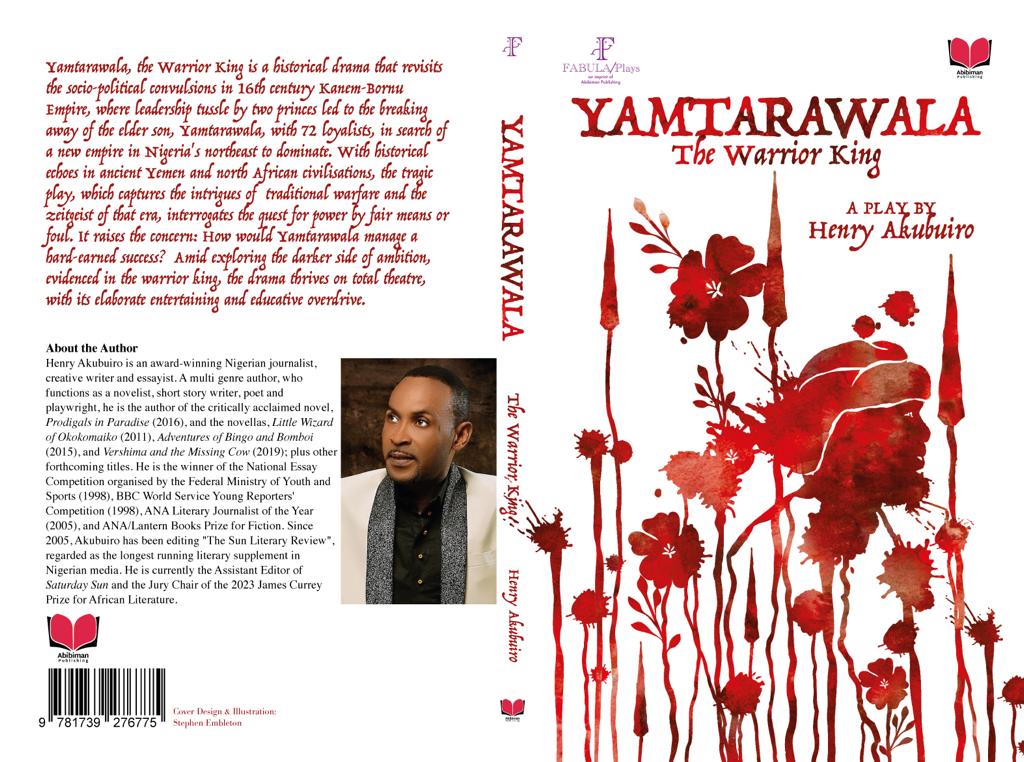
Title: Yamtarawala, the Warrior King
Author: Henry Akubuiro
Genre: Drama
Pages: 132
Year of Publication: 2023
Publisher: Fabula, an imprint of Abibiman Publishing.
Reviewer: Khalid Imam
Henry Akubuiro′s riveting play, Yamtarawala, the Warrior King, is without doubt a great historical tale and a gripping account about dream and ambition, defiance and courage, hope and tenacity, the truth and falsehood, rise and fall, and about making peace at home and waging wars outside. For sure, this is a story about a man′s unyielding quest to journey through the forest of life not minding the mountains, but triggered by hope as a sunbeam.
Deploying craftsmanship, dexterity and genius in this historical narrative, the playwright has stunningly retold an amazing legend about an elder prince (King Abdullahi/Yamtarawala), who lost out the throne to his younger brother, Umar, through what could be painted as the palace′s ceaseless conspiracies. Despite the fire of ambition in him, instead of plotting a bloody civil war to attempt dethroning his younger brother like in the case of the tragic but famously known Yakin Basasar Kano – where a fierce battle broke between the enthroned emir Tukur of Kano and his brotherly prince Yusuf. For the soul of the exalted Kano throne, the warring camps of Tukurawa and Yusufawa had clashes and several stormy battles for years, leaving many causalities and robbing Kano its air of peace while the civil wars lasted.
For Yamtarawala, the Kanuri lost-out price, opting to make peace at home was his wise decision. The calculating Yamtarawala, instead of serving as matchstick, led his large army of supporters and strong fighters, as if suggesting that fighting blood relations is akin to stabbing oneself with a sharp knife in the stomach.
Yamtarawala, the Warrior King crafted byHenry Akubuiro, a cerebral writer and seasoned journalist from Southeastern Nigeria is not only a confluence where the twin rivers of history and literature met; it is also a fascinating marriage between the past and the present, as the playwright takes us through a rewarding historical dramas set in the Northeast, tracing with graphic details the many wars Yamtarawala fought and the prominent kingdoms he subdued before founding Biu, one of the most influential emirates still existing in Borno state.
One outstanding lesson from the play is a remindee to the reader that, to triumphantly win in the race of life, one should not be cowed by the fear of the plentiful obstacles life may present, as demonstrated by the warrior king, who was, at first, schemed out from ascending his father′s throne by no fault of his, but the circumstances of him being considered a bastard child and unworthy of the throne. Rather than Yamtarawalato watch his scented dream and cherished ambition crash like a building whacked by rockets, the defiantly accepted to pursue his vision with determination and doggedness.
One more fascinating quality of this play is the attempt by the writer to invite readers to appreciate the uniquely exotic cultures and rich traditions of the stoic people of Northeastern Nigeria by preserving and presenting its beautiful portrait with astonishing aptness and commendable deftness. The drama also tries to succinctly revisit ancient African past by showcasing the gains and ills of the clannish wars that defined borders and boundaries of kingdoms and empires, as well as shaped the limit of their influences. It interrogates the the roles and rights of womenfolk and their contribution to society, despite the exploitation they were subjected and the dangers they lived with in most situations during endless wars.
More significantly, the play not only sheds light on how the prominence of Ngazargamu, the ancient of Kanem-Borno Empre in the 16tht century and how Biu Emirate was formed. The play also presents this glamorous history of Biu to the outside world in the most creative and dazzling manner, using the elegant diction and striking language that delights the ears and pleases the eyes, by a passionate, concerned and nationalistic outsider –the author, an Igbo man.
As Shaibu Husseini, Ph.D, Director of Dance and Music, National Troupe of Nigeria briefly stresses one of the strength of Yamtarawala, the Warrior King written byHenry Akubuiro, is the ability of the author to expertly use simple dialogue in the play and laced it with “…a good deal of spectacle and action that is competently handled with much sensitivity to the history and culture of Biu people”.
Sure, reading the play assures that the writer dived deep into the sea of research for him – a non-Muslim who seemingly lived all his life outside Muslim dominated communities to present a drama with Islamic setting with such commendable mastery and use of perfect Islamic tenets and ethos, is remarkable and praiseworthy.
Although the play ends with a sad tragedy – the hero′s fall from the splendid grace to the hateful grass, it is still both thrilling and educative. And what the tragic end of Yamtarawala exploits achieves, as well as reinforces is the fact that the author is an adroit handler of complex play plot. In this wise, I doff my hat to the dramatist, as well as invite all lovers of drama to read or watch the stage performance of this action-packed legend, well enriched with awesome scenes and sonorous songs.
Akubuiro has put together a stunning work of total drama brimming with mind-blowing aesthetics, somgs, dances, music and folklore. The wellwrought spectre in the play is a study in ingeneous stagecraft.
Khalid Imam is the Initiator of Kano Schools Festival and Chairman, Board of Trustees, Poetry Renaissance Trust, who is based in Kano state, Nigeria. He can be reached via: khalidimam2002@gmail.com



